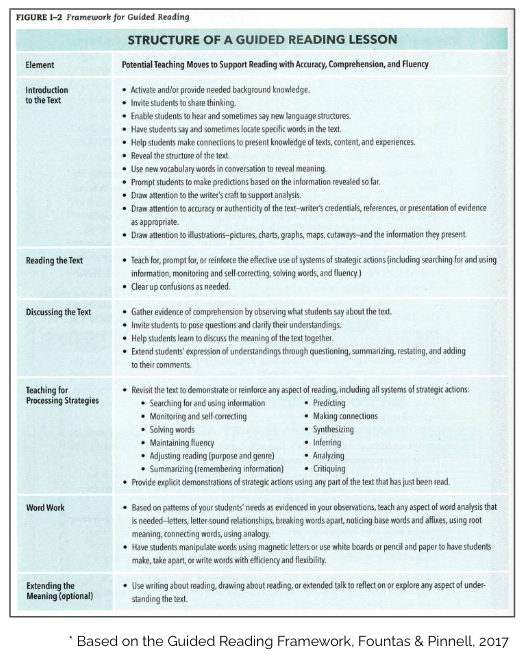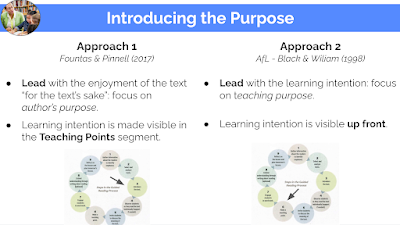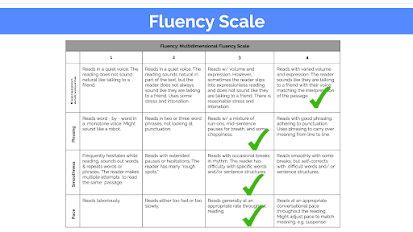The session about guided reading has given me lots of practical ways to support learners and direct guided reading.
I think today's focus really helped me to think about the intention in my planning and how to get the most out of the time I have with the group.
I really liked how it brought us back to the structure of the guided reading lesson. I think this was a good reminder to keep the reading lessons structured and have a clear purpose. I think often with my groups, especially with our school focus being on extended discussion, I can get caught up in the discussion part of a lesson. I am going to be using the structure to guide my planning and to be more intentional.

I also found the approach to the lesson a useful point. I often feel that we start our lessons by introducing the learning intention but the teaching doesn't come until later so the link for the learner may not be as clear or explicit for our learners. By considering our purpose and approach we can make the most out of the explicit teaching moments, keeping them short and concise, while still getting what we intended to out of it. It can also mean we are able to promote the enjoyment of the text and discussion without it getting lost in the 'teaching point'.

It is important to think about your purpose and approach when activating knowledge. Make sure your questioning is specific to get out of the activation what you intend, relating to the text schema. It is easy for prior knowledge to lead off on a tangent and lose connection with the intended purpose. Even the way you pose questions can change what you get from the students. I like this example from the activity we did. The teacher asked a question about breeding programmes and still got the information about what her students know about the term breeding.
It was great total about ways to observe our reader fluency. in the senior school when students have moved from the learning to read to the reading to learn phase we often forget to observe the reading aloud of students who are reading to learn. These observations are important for us to understand their reading fluency. This section gave some good tips for observing the reading aloud. Using the recording of reading to observe will be helpful as it can be done outside of the classroom time which can help us to meet needs by focusing on what our students need. I plan to use this approach by continuing with the recording of the reading. I did like the fluency rubric too. I think it would be great to add to the slide where the students record their reading so that they can self-asses their own fluency. I also liked the point that it is Ok to use the correct or more academic terms with students (for example, intonation), we just have to teach what that means.

There were also a lot of great resources and ideas for us to use. The idea of having a play on your site for graphic organisers and teaching students to find the one they need creates independence for the students and is time-saving for us. I like the anticipation guides and use of KWL charts etc to build prior knowledge, depending on the topic and purpose they could be used prior to coming to the group session.
I am looking forward to putting these things into practice and being more intentional with my planning for guided reading. I am hoping that this can back to the teaching rather than the instructions (as Georgie said), and give my groups more time to focus on the key teaching and having those deeper extended discussions.
The Kahoot was also a great way to finish and consolidate our knowledge, even though it was a little bit stressful. I wonder if that is how some of our students feel when we give them those kinds of tasks? It was great to come second though 😂 I am not usually that competitive!




Kia ora Sarah
ReplyDeleteI'm really pleased to hear that Day 4 went well for you and offerred many practical ways to support learners through the Guided Reading approach. As you point out, the Fountas and Pinnell framework is a good reminder of the elements and structuring of a guided reading session. I agree that the 2017 framework, which you have made a copy of, is really useful for supporting ‘teaching moves’ against each of the elements.
We always aim to make sure that you have a good selection of resources to take away so I was super pleased to hear that the observation protocol, fluency rubric and the Skill Builder templates are especially helpful. It's great to hear that you are excited to put these into practice and in making refinements to your guided reading planning and instruction.
All the very best for your practice implementations for the homework over the next couple of weeks. and certainly look forward to hearing all the positive outcomes and any challenges that we can help with.
Nga mihi
Naomi R.
Literacy Facilitator - Manaiakalani Reading Practice Intensive